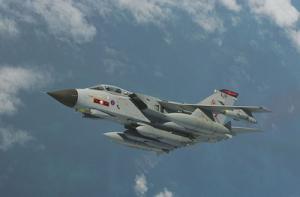ISISU.K. attacks ISIS oil targets in first British military action in Syria
In the first British military strikes in Syria, four British Tornados have dropped precision munitions on seven ISIS targets in eastern Syrian. All of the targets were part of the Islamist organization’s oil production and distribution system. The planes left on their mission from the RAF Akrotiri airbase in Cyprus less than an hour after the House of Commons authorized a U.K. military campaign to destroy ISIS targets in Syria. The United Kingdom has already been part of the U.S.-led coalition against ISIS, but British military strikes were limited to attacking ISIS targets in Iraq.

British Tornado GR4 in flight // Source: commons.wikimedia.org
In the first British military strikes in Syria, four British Tornados have dropped precision munitions on seven ISIS targets in eastern Syrian. All of the targets were part of the Islamist organization’s oil production and distribution system. The planes left on their mission from the RAF Akrotiri airbase in Cyprus less than an hour after the House of Commons authorized a U.K. military campaign to destroy ISIS targets in Syria.
The United Kingdom has already been part of the U.S.-led coalition against ISIS, but British military strikes were limited to attacking ISIS targets in Iraq.
The Telegraph reports that Defense Secretary Michael Fallon disclosed that the aircraft were using Paveway bombs and had “dealt a real blow” to the ISIS-controlled oilfields. Fallon added that the British campaign would initially focus on ISIS depots, supply routes, logistics, command and control, and oil wells, and would not involve attacking targets in the organization’s de fact capital of Raqqa.
He said that six additional Typhoons and two additional Tornados were being flown to the RAF airbase in Cyprus to take part in future attacks.
On Wednesday night, after an 11-hour debate, the Commons voted 397-223 to authorize military action. Sixty-six Labor MPs defied the call by the party leader, Jeremy Corbyn, and voted with the government. Seven Tory MPs voted against aauthorizing airstrikes.
Fallon said the air campaign, which at some point would be supported by reconstituted Syrian troops, could last as long as three years. “The American estimate of the campaign in Iraq, which began last year, was that it would last at least three years and we’re not halfway through that yet. The operations there by the coalition have lasted just over a year and the prime minister has been pretty clear that this is going to be a long campaign to ensure that Daesh [ISIS] are thrown out of Iraq and that they are degraded and defeated in eastern Syria. This is not going to be quick.”
Fallon said that French officials told him that after France joined the air campaign against ISIS a month ago, they had been surprised by the number of ISIS infrastructure targets.
Fallon said he was cautiously optimistic that a path to a political solution in Syria would open up this month, beginning with an agreement among the various Syrian opposition groups which are currently holding talks in Saudi Arabia. Representative of a united opposition representatives would then attend UN-sponsored peace talks, probably in New York, involving all the important regional partners, including Iran.
Fallon said: “We want a new Syrian state including some of those who are fighting it helping on the ground. Obviously we hope in Syria that we will be able to get the Free Syrian Army, who at the moment largely have been fighting [the forces of Syria’s president, Bashar al-Assad], involved.
“The best news is the peace process is under way, [involving] all the key partners, like Russia and Turkey, that will lead to a transitional settlement in Syria that will lead to the departure of President Assad, and a new government that can lead to elections in Syria.”
Fallon added: “The Russians are starting to see a future for Syria that does not involve Assad, adding some of the argument at the moment amongst the various partners is about the timetable.
“While that process is under way we have to deal with this terrorist threat to us in Western Europe and we need to squeeze the terrorists, and that is what the RAF is now free to do.”
